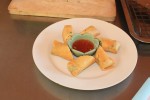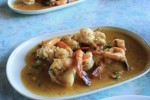On my last night in Hong Kong, I meet up with Sandra, a friend of a friend (Alex) of a friend (Prue), and her fiancee, Stu, a sharp and funny Asian-American couple who have been living in Hong Kong for about a year and a half. They are shocked when I sheepishly suggest Indian food for dinner, but laugh and take me to a place a short tram ride away.
We exchange travel stories–they spent a few months traveling in New Zealand, Western Europe, and parts of Asia before moving here–after choosing curries. It’s clear we’re all still trying to figure out these places, and we spend a lot of time talking about China and India, the two countries that shock and awe the Western media. Just as I was blown away by the mismatch between Western headlines dreading an Indian IT takeover and the wretched poverty on the ground in the subcontinent, so too are Sandra and Stu baffled by the reality of China. “But they are the fastest growing economy in the world, yes?” I say. Well, yes, they say, but there are other things growing alongside it, particularly huge environmental and humanitarian problems. Sandra in particular seems appalled at how expendable human lives seem to the government. “You heard about the pipeline spill, right?” Sandra asks. I shake my head. “Apparently a pipeline burst somewhere near the Yellow Sea. It’s a huge oil spill, even worse than the BP spill, they think. So the Chinese government comes out and says they’ve got the problem under control, that they’re fixing it. Turns out they have people on boats literally scooping the oil off the water with buckets.” “No way.” “Oh yeah. Some of them were using their bare hands. This stuff is really toxic. They don’t care.” Stu talks about how Chinese construction companies keep popping up in Western countries, like Iceland, to handle brief jobs. While they’re there, they pick up industry knowledge, he says, and then bring it back. “But they cut out all the steps in the middle,” Sandra says. “Yeah, because there are all these steps to, say, building a product that incorporate things like consumer safety, worker safety,” Stu says. “But the Chinese figure out, ‘Hey, we don’t actually need those steps! Who cares about that other stuff?'” Sandra shakes her head.
“Is it a big drive to be number one?” I ask. “Do they just want to be the top economy so badly that they don’t care, that it’s all about progress?”
“No, it’s not like that,” Stu says. “Everything the government is doing is about population control, about pacifying the populace. They figured out, you know, people get mad when there’s no food. So they set quotas, they have giant stockpiles of everything–to make sure they have something to hand out, just in case. When too many people move to the cities and there aren’t enough jobs, they start paying people to go back to their rural villages. No, it’s not about being number one. In China, to the Chinese, they’re already number one. They already own the world. They are the world. That’s not a question.”
After dinner, they take me on an Asian dessert tour, treating me to Portugeuse egg tarts–transmitted via Macau–and stopping at what they call a classic Hong Kong diner, an overcrowded cafeteria of plastic bowls and chrome tables, for “steamed milk,” a kind of pudding. We agree all three flavors are mediocre. Stu translates parts of the Cantonese menu while we’re waiting. “The names of Chinese dishes are all idioms,” he explains. I raise my eyebrows. “…Meaning?” “Okay, for example, General Tso’s Chicken. That’s a very Chinese name, because it doesn’t tell you anything about what kind of chicken it is, how it’s cooked, what it tastes like. Beggar’s Chicken, Buddha Jumps Over the Wall Chicken–these are typical names.” I nod. He points to a group of characters. “See, so this says something like…’fragrant coffee with milk steamed and cooled.’ And this one, for the egg flavor, that says something about ‘frozen blossom.’ A Chinese person would know that that means this is the cold version, and not the hot egg skimmed milk with vegetables and meat.” The Chinglish translations that Westerners giggle over make a lot more sense now.
Finally, they show me So Go, clearly the highlight of their night tour. It’s a Japanese grocery store that’s like an Asian version of Trader Joe’s and Whole Foods combined. I’ve never been anywhere with so many foods I can’t even begin to identify. There are bags of peas and beans coated in some rice batter with sprinkles of–is it seaweed?–bags of things coated in what might be wasabi, bags of puffed and dried leaves or stems of unknown origin. There are bags filled with snack paks of sardines. There’s an ice cream counter with flavors like green tea, red bean, and sakura, or cherry blossom. There are samples of nuts coated in batters with flavors we can’t describe, rows of packaged mochi, a counter with dozens of different flavored mochi filled with frozen creams. There the gourmet counters with gift box sets of mooncakes and tea, wafers filled with bean paste, and tiny pastries wrapped neatly in origami folds of tissue paper. There is an entire aisle devoted to seaweed. In the snack food section, Sandra shows me rows of string cheese in flavors like fish, chicken, sausage, fish sausage, etc. and jokes, “This is Asia’s answer to Slim Jims.”



 Six hours later the waters receded some 500 meters away, opening routes to beaches on the far side of Railay and stranding long-tail boats on their sides with their umbilical anchors lying naked, looking silly. It’s somewhat isolated, as even though it’s not an island, you can only get here by boat. No roads! What a great place.
Six hours later the waters receded some 500 meters away, opening routes to beaches on the far side of Railay and stranding long-tail boats on their sides with their umbilical anchors lying naked, looking silly. It’s somewhat isolated, as even though it’s not an island, you can only get here by boat. No roads! What a great place.









